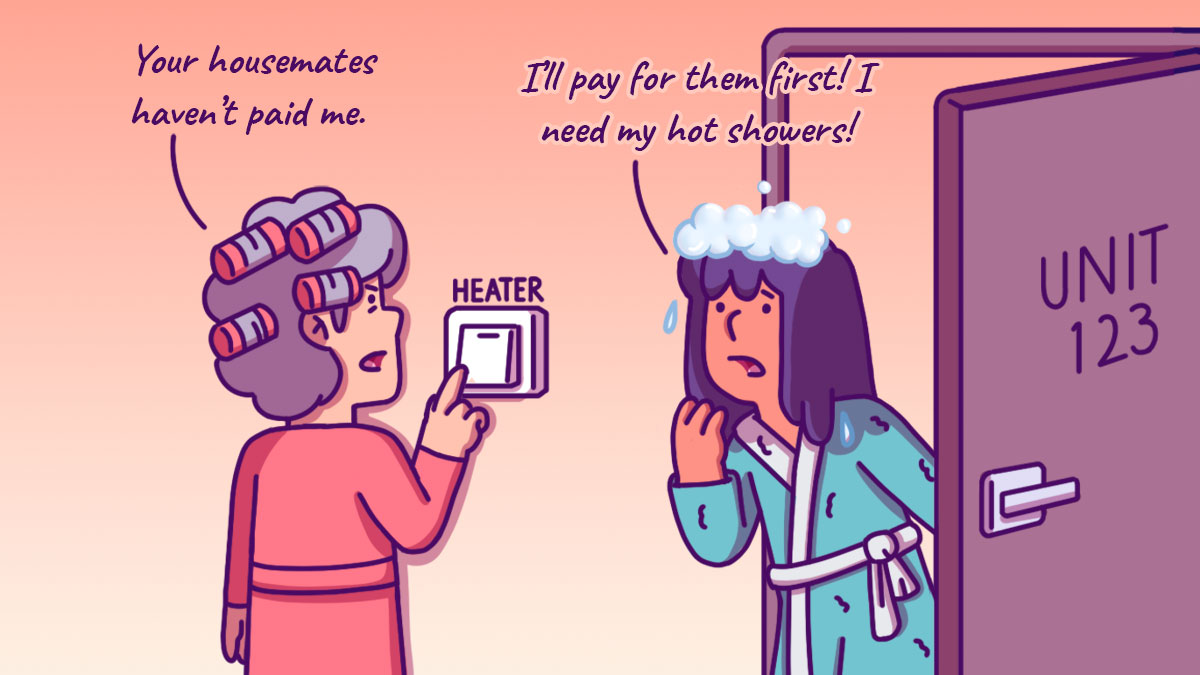Life | Personal Stories | Relationships & Family | Article
Housemates from Hell: How They Can Mess Up Your Finances and What You Can Do About It
by Ooi May Sim | 15 Nov 2022 | 7 mins read

There’s a certain appeal to moving out of your parents’ home and living on your own – you get the freedom to do what you want, you can stay out late without getting nagged at the next day, and you’ll experience what it’s like to fend for yourself for the first time. However, living on your own can get costly. Rent, for one, will likely take a huge chunk out of your paycheque every month.
One way to reduce the financial load is to share a place with a housemate or two so that you can split the rent amongst yourselves. In some cases, you can also split the cost of groceries and transport with your housemates, which helps you save even more money.
But living with housemates comes with its own challenges. After all, you’re sharing a space with other adults who have already developed their own habits, preferences, and ideas of how to act at home and what a home should be.
And sometimes, when you and your housemate can’t get along or have different ways of doing things, your living situation may end up costing you more – mentally and financially.
LC and Stella share their experiences living with less-than-ideal housemates so you can spot the red flags when looking for a future housemate, and save yourself the unnecessary trouble.
They never paid rent on time
“The house was always smelly and dirty, and there was always dirty clothes and underwear on the floor,” recalls LC, of the time when he lived with five other housemates.
LC moved from Taiping to Kuala Lumpur to study and rented a two-bedroom apartment, where he shared his room with one roommate, while four other housemates slept in the master bedroom. They were all between the ages of 18 to 20, and none of them had lived on their own before so the house was perpetually messy and in a state of disarray.
“We had a washing machine, but no one used it. Dirty clothes were just dumped on the floor and sometimes, when (it was time for) class, (my housemates) would rummage (through) the pile of dirty clothes, pick a shirt to wear and go to class with it. It was disgusting!” says the 35-year-old.
Then, there was the matter of rent and utility bills.
Despite paying his rent on time, LC had to live with electricity disruptions because his housemates were always late with the rent.
“My housemates never paid rent on time so our landlady would cut off the electricity and water (supply). This happened every few months,” he says, adding that the disruptions occurred so frequently that his housemates even bought a battery-powered fan and light.
So, to put a stop to the electricity cuts, he took it upon himself to pay for his housemates’ portion of the rent first. But collecting the money back from them on a later date proved to be challenging.
“I had to constantly remind them to pay me back. I felt like a nagging parent. It was so tiring that this burden was on me,” says LC.

To make matters worse, LC’s housemates never turned off the air-conditioning (AC), so their monthly electricity bill was over RM400. This was split six ways, and LC would often spend about RM70 to RM80 just on electricity, although he never used the AC.
This, along with having to pay for his whole unit’s rental upfront affected LC’s cash flow and he often didn’t have enough money for food and other expenses.
“I wasn’t working and had a fixed allowance from my parents. If I overspent, I wouldn’t have money to buy food or go out with my friends,” says LC.
Related
Skirting around the money issue
For Stella, living with her friend nearly ruined their friendship. When Stella was pursuing a degree in England, she moved in with her best friend in an effort to save money.
But because of their history and relationship, Stella and her friend found it difficult to talk about the shared expenses at home so things started to get awkward between them.
“She (felt) paiseh (embarrassed) to talk about money and ask me for rent,” says Stella, who admits that she was also part of the problem.
“Every month, I would manually transfer (the rent) to her, but sometimes, I would forget because I was busy with (course work). (My friend) wouldn’t ask or remind me about it but would sulk and give me the cold shoulder,” says Stella.
My friend liked things done a certain way in the house but didn’t communicate how she felt so it was difficult to navigate those unsaid expectations, she says.
Stella adds that her housemate would ask her to chip in for food as she usually bought groceries and cooked meals for the both of them. Though Stella obliged to pay for her share of the groceries, she felt that her housemate had more expensive taste in food and tended to buy expensive ingredients to cook with.
“I was spending more money for shared expenses that I didn’t even want in the first place,” she says, but added that she avoided talking to her friend about it because she didn’t want to hurt her feelings.
“It was fun at the beginning, but our relationship began to get strained. The pandemic didn’t help. We were constantly in each other’s faces, and I would lock myself in my room so we didn’t have to (interact or step on each other’s toes),” says Stella.
Related
Setting expectations and boundaries with housemates
Both LC and Stella have since moved out from their shared apartments and are living on their own now, but looking back, here are some things they wished they would have done differently:
Vet through housemates with an interview
One way to minimise the likelihood of living with a problematic housemate is to find a person that is compatible with you. You can do this by interviewing potential housemates thoroughly before they move in.
“Treat it like you are employing someone. Interview them and watch out for red flags,” says Stella.
Discuss house rules
Plan and set house rules together so everyone is on the same page.
Stella and her housemate mapped out a schedule for utilities, so both of them had a turn to use the washer-dryer.
Being courteous such as taking out your clothes from the machine after the cycle is up so other people can use it, also helps, says Stella.
Set boundaries
“I was the only one who (owned) a car, so my housemates would always ask me to send them to class and out to dinner. And they never chipped in for petrol,” says LC.
LC’s housemates also never turned off the AC, so their electricity bill was absurdly high. After numerous talks with his housemates about turning off appliances when not in use fell on deaf ears, LC decided he had had enough.
“I told them I wouldn’t be paying for electricity anymore, unless they made some changes,” he says.
He also set boundaries with his housemates by telling them he wouldn’t be fetching them to class anymore and would only drive when they go out for dinner together.
Work out a budget and payment schedule
To ensure bills and rent is paid on time, you should plan the household budget together and fix a deadline for when payments must be made, says Stella.
You should also identify who pays for what, especially when bills are concerned, she adds.
Communicate with each other
Talk to your housemate about your limitations and financial boundaries.
“Be honest about how you feel and that you only have a fixed budget every month so that they can be more mindful and considerate,” says Stella.
Move out
When all else fails, sometimes, the best solution is to simply move out.
“As soon as my two-year contract was up, I moved out of the shared apartment,” says LC, adding that it was the best decision he made for himself and his finances.


















